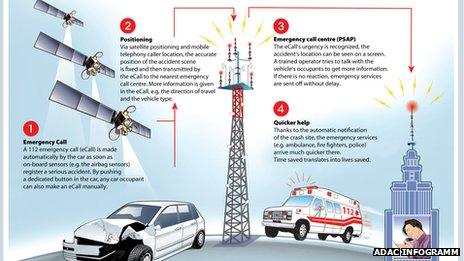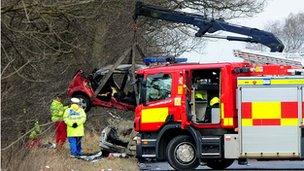EU plan for cars to call an ambulance after crashes
- Published

All new cars will be fitted with a tracking device that will automatically alert the emergency services in the event of an accident, under EU plans.
MEPs this week backed moves to make the eCall system, which uses sensors to call the nearest emergency centre when a car crashes, mandatory from 2015.
The European Commission has dismissed privacy fears, saying it could save up to 2,500 lives a year.
The UK government has yet to sign up to the initiative due to cost concerns.
The EU already has a cross-European emergency services number, 112, which can be accessed from any member state.
The European Commission wants to extend this service by connecting it to a device in people's cars.
The eCall system is triggered by sensors in the vehicle like those which cause protective airbags to explode in a crash.
Once triggered, the device automatically contacts the nearest emergency service centre, via the 112 service.
It transmits the exact location of the vehicle and other data, such as the make of the car, and establishes a voice connection with the emergency services operator.
Conservative MEP Daniel Hannan opposed the proposal when it was debated in the European Parliament.
He told the parliament: "My constituents have never said, in the 13 years I've being doing this job, that what they want is a common European number to call in emergencies."
'Commercial'
Keith Taylor, a Green MEP and member of the Transport and Tourism Committee, supports the system, saying: "From a road a safety point of view it has got to be a good idea. We must stop thinking people have a right to drive a car. It is a responsibility to drive safely."
The EU has been trying to introduce eCall for nearly a decade, but attempts to bring it in voluntarily have failed.
The technology is already being used by some car manufacturers but only a small proportion of cars in the EU (0.4%) are currently fitted with the system.
The Commission now wants it to be compulsory for all cars made in the EU, at a cost of around £80 (100 euros) for each device, when fitted in the factory.

Emergency response times could be cut by up to 50% with eCall
Making the system mandatory could, the Commission says, cut emergency response times by up to 50%, saving thousands of lives each year and reducing the severity of injuries of those involved in accidents.
A <link> <caption>European Parliamentary committee report</caption> <url href="http://www.europarl.europa.eu/sides/getDoc.do?type=REPORT&reference=A7-2012-0205&language=EN" platform="highweb"/> </link> says it should go further and consider extending eCall to other vehicles like buses, coaches, lorries and motorcycles.
Although the eCall service will be provided free of charge, the Commission expects the technology to be used for commercial purposes in future, such as tracking stolen vehicles or charging road tolls electronically.
However, Mr Taylor said that while it was technically possible for the technology to be used for road pricing, "there is no current plan to introduce it" and "any introduction would have to be thought about very carefully".
Concerns have been raised over data protection, but the Commission argues that because the eCall normally "sleeps" and does not allow vehicle tracking outside emergencies this was not a problem.
During a debate in the European Parliament a number of MEPs urged the Commission to move forward with the proposal, with MEPs later backing it in a vote.
'Clear signal'
Dieter-Lebrecht Koch, a German MEP and vice-chair of the Transport and Tourism Committee, said the system had the support of 80% of European drivers and claimed thousands of people would be alive today if emergency services had reached them sooner.
"We shouldn't be dragging our feet," he said.
Other functions, like real-time traffic information and data on the availability of parking spaces, "could be incorporated in due course", he added.
Fellow committee member, Olga Sehnalová said the system would be a "major contribution to improving passenger safety at the EU level".
"The eCall system must operate throughout the whole of Europe and it can't depend on procurement prices in each individual country," she said.
The European Parliament needed to "send a clear signal to the Commission that it is not acceptable to delay this any further", she added.
Most EU member states have now signed up to the initiative but the UK and France have not yet backed it.
'Cost not justified'
The UK government is concerned about the cost of a mandatory eCall system suggesting it may outweigh any benefits as the UK already has a good road safety record.
Transport minister Mike Penning said "Britain has some of the safest roads in the world and technology has an important role to play in this, but it is important that each initiative is carefully considered on its merits.
"After considering the results of independent research we are concerned that the benefits of making eCall mandatory in all new cars will not justify the cost of implementing it in the UK. We have decided, therefore, that it would not be appropriate for the UK to support mandatory installation of eCall at this stage.
"However, calls from vehicles equipped with a private eCall system are already supported by UK emergency call centres."
Responding to the debate, Transport Commissioner Siim Kallas welcomed the "firm support" of the Parliament and said the Commission hoped the system would be fully operational by 2015.
He said a regulation was being drafted and would be available in the "coming months".
"We believe mandatory implementation will make the cost affordable to all parties thanks to economies of scale," he told MEPs.
He said the Commission would support awareness and education campaigns to ensure eCall was properly used.
- Published28 June 2012
- Published19 April 2012
- Published6 December 2011